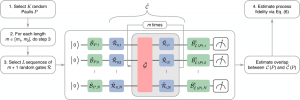Summary
The overall goal of the project is to develop practical methods to be able to reliably run useful applications on near-term quantum computers. This requires identifying and overcoming the ubiquitous errors that currently limit quantum computing capabilities. Traditional methods of quantifying errors in quantum computers fail to predict how errors affect the output of a quantum computation because the exact impact depends upon the exact form of the noise, additional errors arising from interactions between control mechanisms (e.g., crosstalk) and idle qubits, and how the gates are translated and scheduled into temporal pulses. One promising way to account for global errors is to define a parallel quantum instruction (PQI) to be a set of quantum operations executed in a fixed temporal order, including all idle gates for qubits that are not explicitly targeted by any quantum operation. In this project we develop a general method for reconstructing global noise during a cycle of parallel quantum gates and a framework for mitigating and/or extrapolating errors, leading to an experimental demonstration of their effectiveness. This will enable near-term quantum computers to be used to accurately simulate quantum systems and to determine the accuracy of the simulations.

Figure 1. Schematic circuit implementation of the experimental cycle benchmarking protocol for characterizing a noisy parallel quantum instruction G (red). The green gates are used to probe how closely G maps different input states to the desired output state. Random gates (blue) are used to engineer a simple noise model to make the characterization protocol accurate and efficient.
Related Content

Chiral Quantum Antenna Based on Multilayer Metasurface
Summary Individual atoms can act as stationary qubits and thus serve as nodes in quantum computing networks or as memories for quantum repeaters. However, to successfully use qubits based on single atoms suspended in free space, photons emitted by a single atom need to be efficiently collected. Conventionally, this can be done with high […]
September 20, 2018

Composite Superconductors for Improved Quantum Coherence
Summary Conventional superconductors have trouble performing well in magnetic fields required for electron spin resonance (ESR) – based quantum information processing applications. We can, however, use proximity engineering to select desired properties from different materials and combine them for improved superconducting performance in magnetic fields — an improvement that would have strong implications for […]
December 12, 2018

Novel Infrared Camera Based on Quantum Sensors for Biomedical Applications
Summary In this project we develop a novel infrared camera with low noise and high detection efficiency for biomedical applications of optical coherence tomography (OCT) using quantum materials. OCT is a technique used to image the back of the eye and allow for the diagnosis of detrimental eye conditions, for e.g., macular degeneration, diabetic retinopathy […]
March 13, 2019


